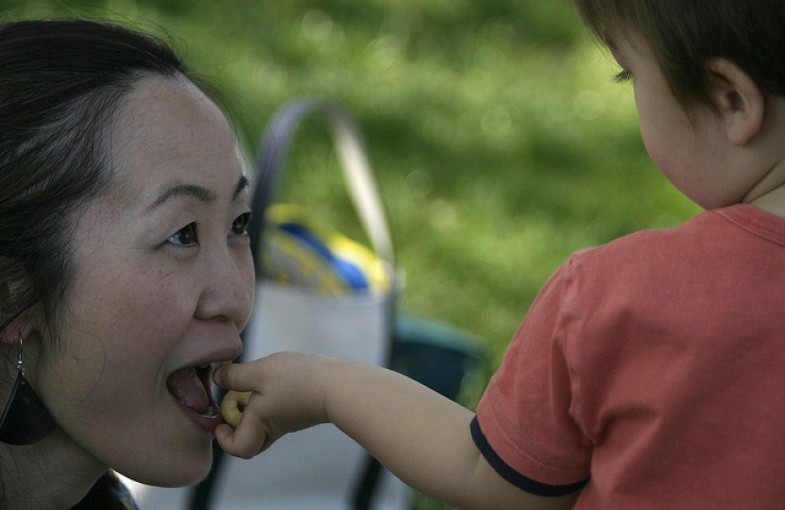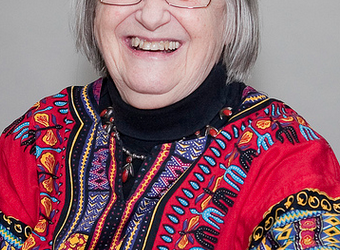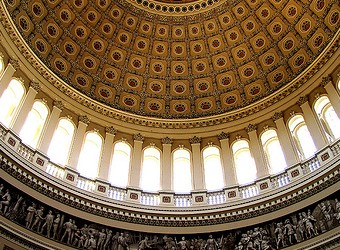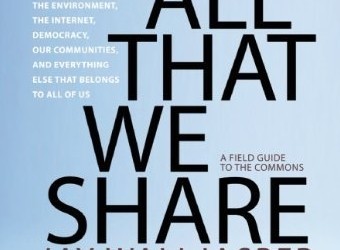Human decisions and human activities are imposing enormous costs on the life-support systems of planet Earth. Left unchecked, the results will be catastrophic for all living things, including humans. Some of the damage to life and the systems that support life is irreversible. Fortunately, the message is out there to “save the environment.”
What may be equally important is a message about the need to save ourselves from repeating the kind of decisions and actions that brought us to the environmental crisis in the first place. In the framing of this message, we might critique a theory proposed by Garrett Hardin in an essay, “The Tragedy of the Commons.”
“The commons” -- as Hardin used the term -- refers to a shared pool of resources. In Hardin’s parable, the commons was a pasture where people grazed their privately-owned animals to sustain their livelihood. This system of having a pasture open to everyone in the community worked fine until each herdsman, acting independently, sought to maximize his own gain by adding to their herd. The result was that each animal added to the original total degraded the commons a small amount. While this degradation was slight relative to the gain in wealth for the individual owners, the overall effect of adding animals to the pasture resulted in destruction of the commons. Thus, the tragedy.
But the real tragedy, as expressed by Hardin, was that each man was locked into a system compelling him to increase his herd without limit, while the world in which the people operated was limited. Is such ruin inevitable? Are we really locked into a system that predestines us for ruin? If so, the tragedy extends beyond any material loss we may endure, as we will also experience a loss of soul. If we’re locked into a system that compels us to maximize our own gains at the expense of the common good, it’s not only the commons that will become degraded -- our humanity will become degraded, as well.
But is Hardin right? Have we no other option than to live in a society where people seek their own self-interest at the expense of the common good? Hardin says that “psychological denial” is a part of the problem – a problem he describes as giving ourselves permission – or the freedom – to deny the truth about the necessity of embedding individual good within the context of what is good for society. It’s this freedom, Hardin says, which ultimately leads to our own destruction.
Some might argue that the people in Hardin’s parable were compelled to act the way they did because we, as humans, are basically selfish. It might also be argued that the people in the parable were only following the rules of an economic system that operates on the working principle of free enterprise – a system in which individuals and private businesses operate in competition and are largely free of outside control. The loss of the commons, some might suggest, is just a byproduct of this economic system.
What if the commons is more than a pasture? What if the commons encompasses all the resources of the planet – water, air, soil, and entire ecosystems? What happens if these are destroyed? We, of course, don’t like to imagine such a possibility; yet, we know that many of the earth’s living systems are endangered and that we, as humans, play a role in this destruction. As individuals, we might be adding just a bit to this destruction, but the overall devastating effects can’t be denied.
So what are we to do? Can we rid ourselves of the “psychological denial” Hardin describes? Can we create a system that looks out for the good of the commons and the good of society? If so, we may find that taking care of the commons results in taking care of ourselves, as well.
To create this more positive future, let’s start with the premise that we, as a society, aren’t predestined to live out the tragedy of the commons; that such a tragedy for the natural world and ourselves isn’t inevitable. What’s required, however, to prevent such a tragedy is a shift in what we believe about ourselves and the social world in which we live, as it’s only changes in our thinking that will allow us to make sweeping changes in our behavior. We need to admit that without such changes, our collective impact on the natural environment and ourselves will be devastating. We also need to recognize and value the fact that the well-being of humans involves more than physical health and material wealth.
As humans, we have self-actualizing and spiritual needs as well as material needs. Psychologists tell us that one critical component of self-actualization – or of achieving our potential as humans – is being concerned about more than our own self-interest, including being concerned about future generations. We aren’t born with such a concern, but it can develop over time. During childhood and young adulthood, our focus of care tends to be on self and people in our immediate circle, such as parents, siblings, and friends. As we mature, however, our concern often extends to a wider circle of people. We may even begin to define ourselves in relation to all of humanity. For some people, this concern extends to all living things and the systems in which they live.
Few people ever become fully self-actualized or reach their full potential in psychosocial development, because there are many factors which get in the way. Unhealthy competition – as reflected in Hardin’s parable where people were competing for greater personal wealth in a field of limited resources -- is one example of what impedes development towards self-actualization.
If it’s possible for us to break out of a system that compels us to seek our own gains at the expense of the common good, a next logical question is “Where do we start?” While Hardin suggests that we look to education as one avenue for counteracting the natural tendency to do the wrong thing (and the thing that will lead us to ruin), he also calls for mutual coercion. But to save ourselves (in the holistic sense of the term) as well as the environment, we may need to go one step further. Coercion my save the environment, but will it save our psyches and our souls? For the holistic well-being of humans, we may need to focus – not just on the environment – but also on our emotional and spiritual connections with the natural world. We may also need to view ourselves differently – recognizing that we are a part of the biotic community rather than just users of natural resources; acknowledging that while we have a tendency to take more than our share of resources, we also have inclinations or needs relating to self-fulfillment in the non-material realm. Once we realize that a healthy and diverse natural environment is an essential condition for living a life of satisfaction and joy, we will be more likely to protect that environment and enjoy the many benefits of caring for that which sustains us.
The need to shift our thinking about how to relate to the natural environment isn’t new. Aldo Leopold – even before the publication of “The Tragedy of the Commons” -- argued that an ethic of care was an essential part of our relationship with nature. This ethic of care – termed by Leopold as “the land ethic” -- changes the role of humans from users and conquerors of the land-community to members and citizens of it. Leopold’s land ethic is based on the understanding that land is more than just a set of resources and that our relationship with it should be based on respect and love. The land ethic also implies respect for our fellow members of this community, including all living things and the ecosystems of which they are a part. Leopold argued that our ability to perceive beauty in the natural world may promote voluntary self-restraint (versus coercion) for the sake of ecological sustainability.
E.O. Wilson, a Harvard University professor, is a contemporary thinker and writer who also addresses the importance of a land ethic. This ethic, he says, must be based on the “best understanding of ourselves and the natural world.” A “best understanding” about ourselves includes the recognition that our needs and drives reach beyond self-interest and that a protective relationship with the land supports – not only the well-being of the land – but our holistic development, as well.
According to Wilson, humans have an innate urge to affiliate with other forms of life. Wilson calls this “biophilia.” Ignoring biophilia within ourselves is to ignore a core component of our ecological self or ecological identity. This part of ourselves is nurtured through intimate connections with the natural world, which Wilson refers to as “the birthplace of our spirit.”
Without attention to our ecological identity and without frequent positive experiences with the natural world, we’re likely to develop a psychological detachment from nature. This detachment allows us to view the world of nature as simply a set of resources to be used for our material advantage. We may even develop a prejudice against nature based on misinformation and unfounded biases. If we live with psychological detachment from the natural world, we’re likely to repeat over and over again the tragedy of the commons.
The environmental crisis is forcing us to rethink who we are and how we live. This, in the end, may be an unexpected blessing of a very troublesome and unwelcome situation. If we can rethink who we are and not allow ourselves to be locked into the psychological denial presented in “The Tragedy of the Commons,” we can be optimistic about the future. Some might call such optimism naïve or just wishful thinking -- that we really are locked into a belief system that compels us to take as much as we can get from a world of limited resources. But perhaps Hardin’s analysis is incomplete. Perhaps there is another way to relate to the commons and each other. Perhaps we can envision and then create a world where caring for the commons is our first priority.
Caring is a powerful force – certainly more powerful than coercion. Caring comes from within; coercion from without. If our inner core is strong and if we truly care about something or someone, we won’t have to be coerced into doing the right thing. Our actions will be motivated by a strong sense of protection and solidarity.
As individuals and as a society, we may be able to move out of the psychological denial of which Hardin wrote. We can start by giving ourselves permission to think and act differently, so that we aren’t compelled to make choices that rush us toward ruin. But to do this, we need to be concerned about feeding our souls as well as our bodies. Ironically, this direction often involves taking the focus off of ourselves. If our focus is on nurturing the well-being of the environment, we may soon find that we’re nurturing ourselves and our communities as well.
On a small scale, we see this happening with community gardens. Especially when operated as one community plot (versus individual plots), the garden becomes “the commons” for the people involved. In some communities, these gardens are planted and maintained by small groups of people who then give the food away. While open to everyone in the community, most of the garden produce goes to people in need. Yet, everyone benefits. People who work in the gardens benefit from exercise, the joy of gardening, and camaraderie and positive social interaction. They also enjoy the satisfaction of doing something meaningful by helping others. Communities benefit by conserving resources, reducing crime, and improving the aesthetics of a neighborhood.
Perhaps what can happen with “the commons” on a small scale (e.g., community gardens) can also happen on a much larger scale with the entire natural world. Based on where we are today in terms of how we’ve abused the natural environment and the priorities that govern our lives, we may jump to the conclusion that there’s little chance of creating a more peaceful, sustainable world. But let’s not give up hope. Let’s not allow one parable (“The Tragedy of the Commons”) to stymie our thinking. There are other parables to consider – the Biblical story of the loaves and fishes, for example.
In this story, a large crowd had gathered to listen to the teachings of Jesus. By the end of the day, Jesus realized that the people were hungry, and he had compassion on them. The only food available was seven loaves of bread and several small fish; yet, when these were distributed, everyone had enough to eat. There were even seven baskets of food left over.
Of course, this story is presented as a miracle – a happening that cannot be explained by natural or scientific laws and is considered to be divine. We tend to like miracles – they require so little effort on our part. Waiting for miracles to save the planet and ourselves, however, may not be in our best interests. Even if we aren’t optimistic about miracles, we don’t have to give up hope. In fact, we would do well to use our current environmental crisis as a springboard to catapult us into a more peaceful and environmentally sustainable way of living.
The idea of pairing what is good for the environment with what will contribute to a more peaceful society is already taking root in some places around the world. We see peace work and environmental activism joining forces. In some initiatives, spirituality is added as a third dimension to this work. The focus of these efforts is on the making of peaceful people living in a peaceful society, where nonviolence, love, compassion, trust, fairness, cooperation, and reverence for the human family and all life on Planet Earth are guiding principles.
Caring for the commons – that is, all the elements of the Earth – can help us as individuals and as a society to develop a sense of ourselves as nurturers and as people who care. Accepting and acting on this sense of who we are can promote a more peaceful way of living – with self, with others, and with the natural world.






